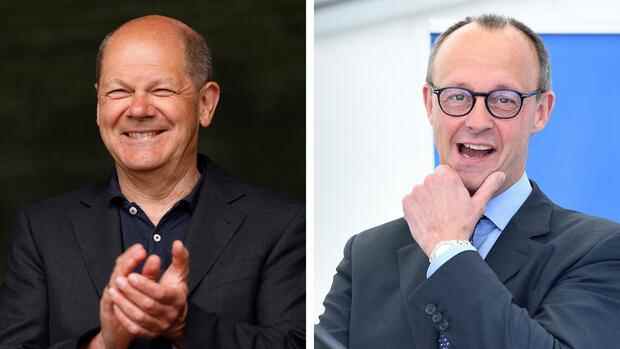Berlin, Herne Shortly before the big election day in North Rhine-Westphalia, the chancellor does not travel to the Ukraine, but answers questions from the NRW broadcaster WDR. Olaf Scholz will give two interviews to WDR – as will CDU leader Friedrich Merz.
The media offensive by the chancellor and opposition leader in the final stretch of the election campaign shows that the election in North Rhine-Westphalia is more than just an ordinary state election. It is a proxy election in which there is also a lot at stake for Scholz and Merz.
Should the SPD actually recapture North Rhine-Westphalia from the CDU, that would ease the criticism of Scholz’s alleged lack of leadership in the Ukraine crisis, as the Chancellor can see his cautious course confirmed. If, on the other hand, the SPD loses the election, the pressure on the chancellor will continue to increase.
Top jobs of the day
Find the best jobs now and
be notified by email.
The same applies to opposition leader Merz. The new CDU chairman could take up the cause of a victory in the most populous federal state with an incumbent without a large bonus. A green-black alliance in NRW would open up options for the conservative Merz for the future in the federal government.
A defeat, on the other hand, would raise doubts as to whether the renovation of the CDU under Merz can really succeed. “The result is the indicator of their previous political course for both the traffic light coalition and the CDU,” says Bonn political scientist Volker Kronenberg.
The elections in North Rhine-Westphalia have always been considered “small federal elections”. A fifth of Germany’s population lives on the Rhine and Ruhr. 13 million people are called to vote, no other state election is so representative of the entire country.
The impact on federal politics should not be underestimated. In 2005, after the devastating defeat in North Rhine-Westphalia, the then SPD chairman Franz Müntefering announced new national elections, which led to the election of Angela Merkel. And it was only thanks to his election victory in 2017 that Armin Laschet was able to become the Union’s candidate for chancellor.
In federal politics, there is little that can be ignored by those who govern in NRW. Prime Ministers from North Rhine-Westphalia are always treated as potential chancellor candidates – unless they take themselves out of the game like Hannelore Kraft (SPD) once did, who rejected all federal political ambitions and thus heralded their political end.
Merz and Scholz therefore showed great commitment on site during the election campaign – and thus also took a risk. On Labor Day on May 1st, the chancellor gave a well-received, emotional speech in Düsseldorf, and he will appear again at the closing rally this Friday in Cologne. Joint posters by Scholz and SPD top candidate Thomas Kutschaty hang on the Rhine and Ruhr.
Merz tries everything so that there is no Scholz effect
Scholz is thus also making the election in NRW a vote on his course. Because unlike in Saarland and Schleswig-Holstein, where the SPD achieved a brilliant victory and a crushing defeat, the top candidates are not so much in focus. That’s another reason why Kuchaty relies on Scholz as the driving force.
Friedrich Merz actively supports top candidate Wüst in NRW.
(Photo: Getty Images)
CDU leader Merz has tried everything so that there is no Scholz effect. His trip to Kyiv, his attacks on the Chancellor in the Bundestag and the debate about the special assets of the Bundeswehr – Scholz should not become a magnet for voters in the NRW election campaign. Merz was omnipresent in the election campaign, made one appearance after the other, and he will appear again in Münster on Friday evening.
North Rhine-Westphalia is his political homeland, a defeat would be particularly bitter. Even if he now holds all the power in the CDU with party and parliamentary group leadership, doubts remain in the party as to whether 66-year-old Merz is the right man for the future.
Merz and the CDU hope that the criticism of Scholz’ course in the Ukraine war and the election success last Sunday in Kiel will give momentum. “The CDU urgently needs more successes after Schleswig-Holstein to show that you have to reckon with them again,” says Bremen political scientist Lothar Probst. For Friedrich Merz, too, the outcome of the election is “extremely important in order to consolidate his position as chairman of the CDU”.
>> Also read: Coalition calculator: Which parties would have the majority in the state parliament?
SPD top candidate Kutschaty was in Herne on Wednesday this week and handed out red roses to passers-by in the city centre. Herne is a city particularly hard hit by structural change and a stronghold of the SPD.
But the comments of the SPD members and passers-by were not flattering here either. An SPD member from the Herne local association says that the CDU, but also the SPD, lacks leaders with charisma. “Scholz doesn’t have the charisma, and neither does Kuchaty.” After all, SPD leader Lars Klingbeil has “potential”.
A passer-by who walks by doesn’t think much of Merz: she’s a nurse, the CDU overslept a lot here. “For me, the CDU with Merz as party leader cannot be chosen.” Another pedestrian, on the other hand, says that the SPD has “gone much too green”.
There is no clear picture of the mood here. That goes with the polls. In NRW, every election outcome seems possible on Sunday. Only one thing is certain: there will be losers. And they are not only called Kuchaty or Wüst, but also Merz or Scholz.
More: All questions and answers about the state elections in North Rhine-Westphalia
